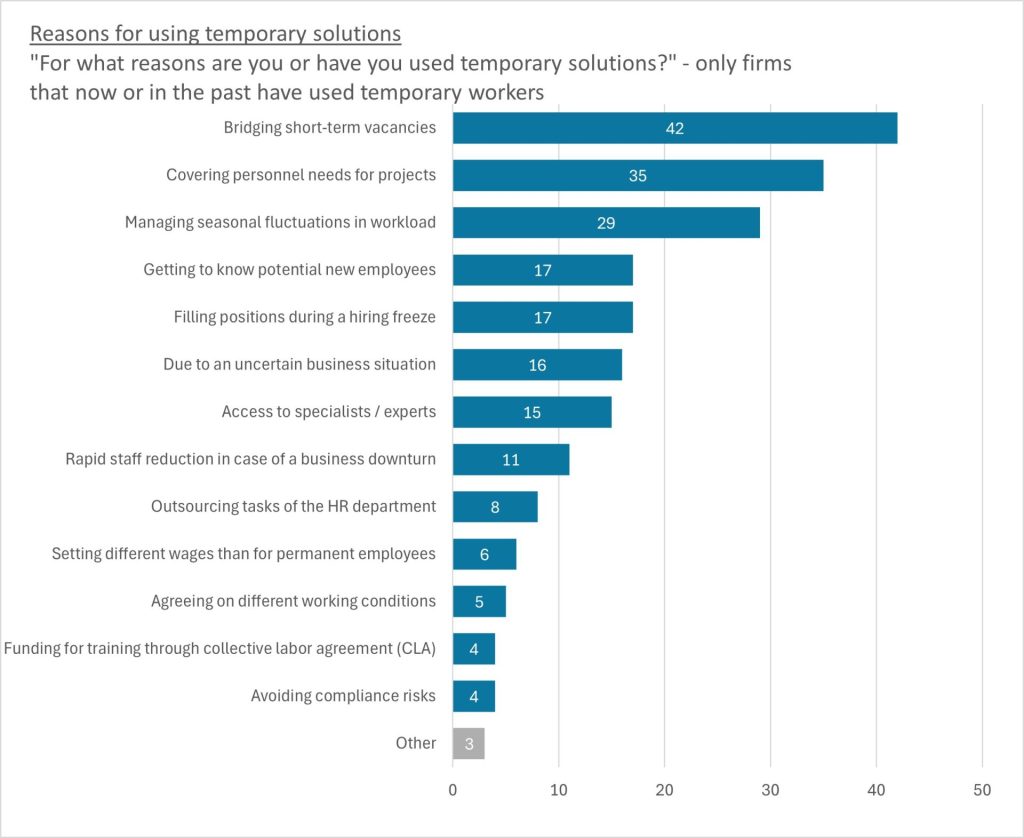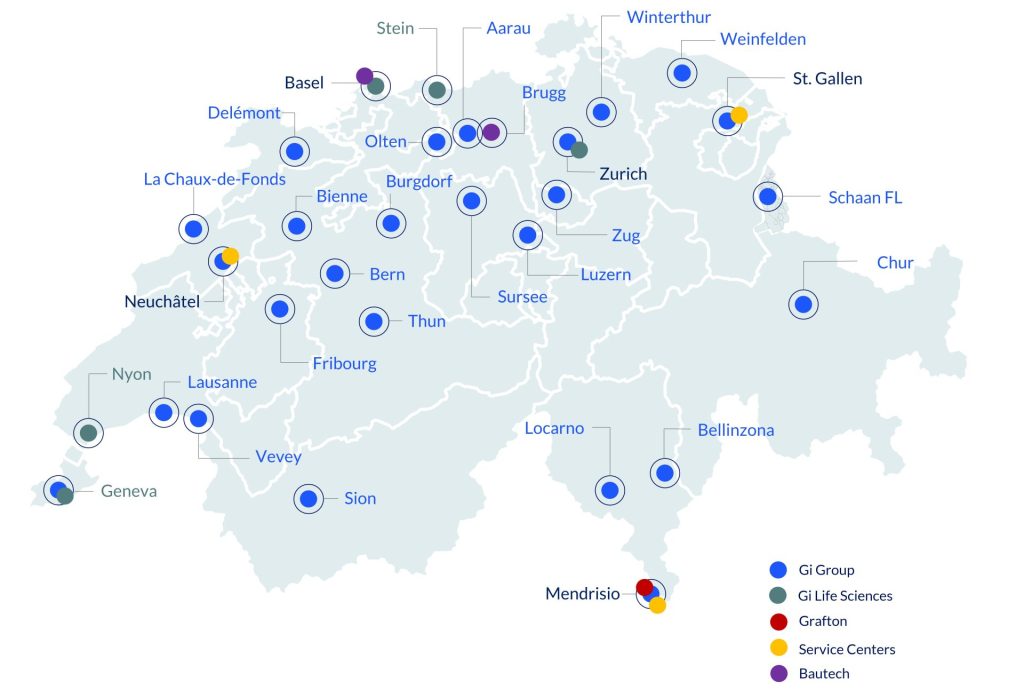The Swiss labour market is under pressure: while companies continue to struggle with an acute shortage of skilled workers, periods of economic weakness and geopolitical developments – such as new US tariffs – are causing additional planning uncertainty. In this article, we shed light on how the talent market is changing and why temporary work as a strategic tool is more important than ever.
The temporary staffing market in Switzerland experienced a historic downturn in 2024: for the first time in over 30 years, the market recorded a decline two years in a row, according to the Swiss Staffingindex. The number of hours worked by temporary employees fell by 4.7 per cent – having already fallen by 5.8 per cent in 2023. The permanent staffing market was not spared either: with a drop of 19.4 per cent, it reached its lowest level since the index was first compiled. The negative trend continued in January 2025: according to swissstaffing, the number of temporary hours worked fell by 8.3 per cent compared to the previous year – the sharpest decline since the pandemic.
US tariffs increase uncertainty – impact on personnel decisions likely
In addition to the economic slowdown and the structural transformation, a new geopolitical development is placing an additional burden on the Swiss economy: the planned introduction of high import tariffs by the US government under President Donald Trump is hitting many Swiss export companies hard.
According to a recent survey by economiesuisse, the umbrella organisation for the Swiss economy, 49 per cent of the companies surveyed expect a significant negative impact on their business activities. In the current situation, characterised by economic uncertainty, automation and increasing external risks, many companies are keeping a cautious eye on the market. While processes are being made more efficient internally, the need for additional staff is decreasing in the short term – at the same time, many key positions in specialised areas such as healthcare, construction, technology and IT remain vacant.
Balz M. Villiger, Country Manager Gi Group Switzerland, puts it in a nutshell: “Where there are jobs, there are no candidates, and where there are candidates, there are no jobs.” In his view, the experience of recent years has shown that companies are less likely to cut staff quickly – the shortage of skilled labour is too tangible to rely on a quick recovery
The shortage of skilled labour remains the dominant issue
This is confirmed by the “Skills shortage and temporary work” by swissstaffing survey published in February 2025 , the association of Swiss personnel service providers. It sheds light on the key challenges facing companies in Switzerland – particularly in the area of recruitment and staff retention. The results clearly show that the shortage of skilled labour remains the dominant issue. 78 per cent of the companies surveyed have had at least some difficulty filling vacancies with qualified candidates in recent years – especially when it comes to experienced specialists and managers. This gap presents many companies with strategic and operational challenges.
Added to this are burdens in personnel management. Around 40 per cent of the companies surveyed report being highly affected by long-term absences – whether due to illness, parental leave or other personal reasons. At the same time, just as many companies are struggling with highly fluctuating personnel requirements resulting from seasonal order peaks, project phases or short-term customer requirements. There is also a growing need for flexibility among employees: many companies are seeing an increase in requests for longer unpaid holidays, which brings with it additional planning uncertainty.
Temporary work is gaining in importance
Against this backdrop, temporary labour is once again gaining in importance. As many as 41 per cent of companies currently use temporary workers, while a further 19 per cent have done so in the past. Temporary work offers an important lever for stabilising personnel resources, particularly in uncertain or dynamic market phases. It is used in various sectors to bridge short-term vacancies, cover project-related requirements or efficiently manage seasonal fluctuations
Case study: Gi Group Medical – flexibility in practice
This is also the case in the healthcare sector: Gi Group Switzerland launched the Gi Group Medical division in October 2024. The offering is aimed at hospitals, retirement and nursing homes and aims to efficiently fill short-term staffing gaps while creating stable, long-term solutions. A central component is the on-call service, which allows Gi Group to respond quickly to staff shortages even outside of regular operating hours – for example during waves of illness, holiday periods or unforeseen absences. “Over the 2024/25 festive period, for example, Gi Group Medical was able to help ensure patient care in over 20 partner facilities by deploying numerous temporary staff. These are not just temporary assignments – try & hire options and targeted permanent placements are also part of the portfolio,” says Balz M. Villiger. “Completely dispensing with temporary work – as recently announced by the Association of Zurich Hospitals (VZK) – harbours the risk of creating gaps in care and overburdening permanent staff,” continues Balz M. Villiger.
The companies’ view is clear: they see temporary work as an effective lever for reacting flexibly and quickly to changing requirements.
Graphic: Survey swissstaffing “Skills shortage and temporary work“, conducted by Sotomo.
“Temporary work secures entrepreneurial capacity to act, reduces staff shortages and makes a significant contribution to Switzerland’s economic stability and competitiveness,” says Balz M. Villiger.
This is confirmed by the study: more than two thirds (68 per cent) of the companies surveyed are convinced that temporary work makes an important contribution to the stability of the economy as a whole. This view is shared across all company sizes and sectors – but is particularly high among companies with more than 250 employees (80 per cent).
Outlook: Temporary work as a strategic instrument
Temporary work is an important strategic instrument for overcoming the challenges on the labour market, emphasises Balz M. Villiger: “Temporary work is no longer just a bridging solution, but a strategic instrument for reacting to market changes, cushioning staff shortages and remaining competitive.”
Those who plan ahead today also rely on versatile partnerships and intelligent personnel solutions. This is where Gi Group Switzerland comes into play, supporting companies with a regional network and comprehensive industry expertise.
How Gi Group Switzerland can help
We find specialised talent to address your current staffing shortages while helping you adapt to the changing demands of the workforce. By prioritising skills over traditional qualifications, we have access to a diverse pool of highly qualified and diverse candidates. We are a trusted partner that understands local dynamics and offers scalable solutions for future growth.
Gi Group in Switzerland









